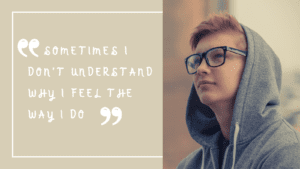- Helpline Number 0300 772 9844
- Everyday - 10am - 10pm ( 365 days of the year)
No Panic’s Youth Hub
Home / No Panic’s Youth Hub

What is anxiety?
Anxiety is a normal, human feeling of fear or panic.
How anxiety affects us:
- Physically – Symptoms
- Emotionally – Fear
- Cognitive – The way we think
- Behave – Avoidance Behaviour
If we look up the word anxiety in the dictionary, we find the explanation:
“An uncomfortable feeling of nervousness or worry about something that is happening or might happen in the future”.
Anxiety is normal. Everyone feels anxiety at times, from one extent to another, it is part of being human, it’s the body’s way of signaling a problem or a threat; crossing the road in busy traffic or going through financial/family difficulties, sitting an exam or starting a new school, etc. It is when anxiety takes control of your life and stops you from doing certain things that it becomes a disorder. When you start to avoid things or everyday situations feel threatening all adds to the problem.
What is a phobia?
Phobias are one of the most common types of anxiety disorders. A phobia is an obsessive, intense and extreme fear of an object, place, situation or creature. People with phobias have developed an irrational apprehension about something they perceive as a danger.
Phobias centre on our normal fear mechanism, so someone who has a phobia is perfectly normal except that they have learnt to get frightened at the wrong times or in the wrong places. The nervous system, which carries messages to and from the brain, is continually telling the brain, that there is something to be frightened of when they are in their ‘trigger’ situations or places, even when there is no real danger present. We logically know there is no actual danger as the danger only feels real to the sufferer and not anyone else.

What is Obsessive Compulsive Disorder?
Obsessive compulsive disorder (often shortened to OCD) is a kind of anxiety disorder that causes repeated and unwanted thoughts and/or feelings (obsessions) and actions (compulsions). Anxiety is one of the most common symptoms and can lead the individual to believe that if a task is not completed, something bad may happen.
OCD Symptoms
Symptoms vary from person to person but may include:
- repeating scary or horrible thoughts
- worry about dirt, germs, illness or dying
- feelings that things need to be ‘just right’
- excessive washing or checking
- temporary relief after rituals
- a constant search for reassurance or getting people to check things for you

What is a Panic Attack?
A panic attack is a sudden rush of extreme anxiety and fear. They are terrifying and can happen without warning or reason. Symptoms can vary tremendously and may include:
- Feeling weak, faint, or dizzy.
- A pounding heart.
- Tingling or numbness in the hands and fingers.
- Sweating.
- Breathing difficulties or chest pains.
- Feeling of extreme fear and loss of control.
What is Self-Harm?
Causing damage to your body in one way or another as a coping strategy which gives temporary respite from difficult emotions. It’s also usually done with either the intention to self-punish, to communicate distress or even both. Find out more
Can I recover?
There is no magic cure or secret potion, but with help, there is a way to change your life around and gain back control. All that is required is a bit of work from yourself along with some practical tools, achievable goals and a commitment to taking steps to make changes happen.
Reaching out and asking for help
Sometimes asking for help is the scariest thing ever . It can be really hard to tell people how you are feeling or the challenges you are facing. It can be tricky to know how to start the conversation or to put into words all you are experiencing. Taking this step might be one of the hardest you will ever take but will probably be the most important. We have prepared a letter that you can copy or simply download and give to someone who you feel you might be able to reach out to, this could be a parent, a sibling, a relation, a best friend, a teacher or even a doctor, we hope it helps. PDF Downloadable Letter
Take a look at ways you can take care of your mental health with our wellness toolkit.

How can we help you?
Our Youth Mentoring scheme is carried out over the phone or by email over a 6 week period. It teaches you learning/coping skills, exposure to your fears. Goal setting and all the tools you need to transform your life around.
If you are aged 21 and under and you want support with your anxiety, please email youth@nopanic.org.uk
Try out our breathing animation to reduce anxiety and panic now.

Search Products
Product Categories
- Books (12)
- CD (3)
- Information Booklets (18)
- Memberships (7)
- MP3 (4)
- Other (2)
- Support Services (14)
- Youth (3)
